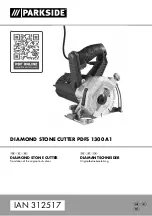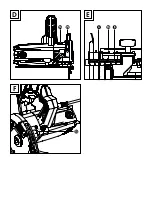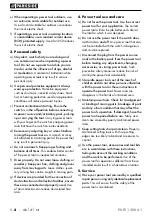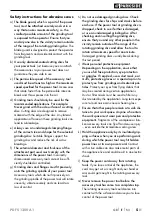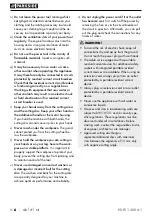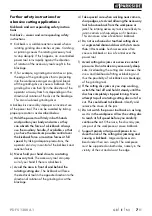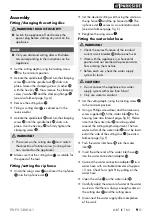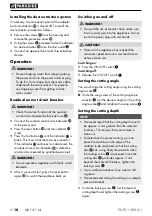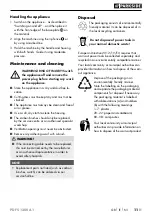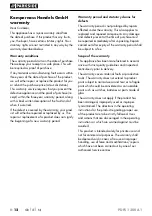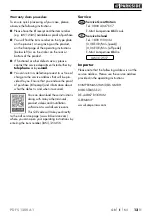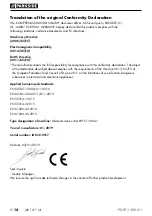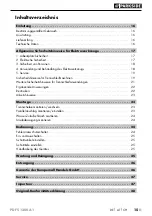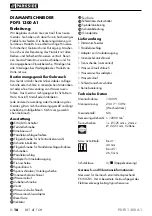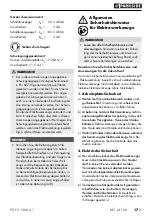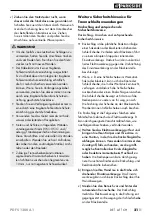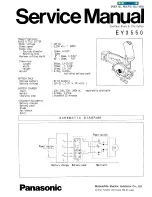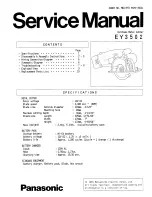
GB
│
IE
│
NI
│
7
■
PDFS 1300 A1
Further safety instructions for
abrasive cutting applications
Kickback and corresponding safety instruc-
tions
Kickback – causes and corresponding safety
instructions
▯
Kickback is a sudden reaction caused when a
rotating grinding disc catches or jams . Catching
or jamming causes the rotating accessory tool
to stop abruptly . If this happens, an uncontrolled
power tool turns rapidly against the direction
of rotation of the accessory tool caught in the
blockage .
▯
If, for example, a grinding disc catches or jams,
the edge of the grinding disc that is projecting
into the workpiece can get caught and break
off the grinding disc or cause a kickback . The
grinding disc can then fly in the direction of the
operator or away from him, depending on the
direction of rotation of the disc at the blockage .
This can also break grinding discs .
A kickback is caused by improper or incorrect use
of the power tool . This can be avoided by taking
proper precautions as described below .
a)
Hold the power tool firmly in both hands
and position your body and arms so they
can absorb the force of a kickback. Always
use the auxiliary handle, if available, so that
you have the maximum possible control over
the kickback force or reaction forces at full
speed.
By taking adequate precautions, the
operator can stay in control of the kickback and
reaction forces .
b)
Never hold your hand close to a rotating
accessory tool.
The accessory tool can jump
out of your hand if there is a kickback .
c)
Avoid the area in front of and behind the
rotating cutting disc.
The kickback will force
the electrical tool in the opposite direction to the
direction of rotation of the grinding disc at the
blockage .
d)
Take special care when working near corners,
sharp edges, etc. Avoid allowing the accessory
tool to bounce back from the workpiece or
jam.
The rotating accessory tool is more likely to
jam in corners or sharp edges or if it bounces .
This can cause a loss of control or kickback .
e)
Do not use chained or toothed cutting discs
or segmented diamond discs with slots more
than 10 mm wide
. Such accessories often
cause a kickback or loss of control over the
power tool .
f)
Avoid cutting disc jams or excessive contact
pressure. Do not make any excessively deep
cuts.
Overloading the cutting disc increases the
stress and likelihood of tilting or blocking and
thus the possibility of a kickback or a breakage
of the grinding tool .
g)
If the cutting disc jams or you stop working,
switch the tool off and hold it steady until the
disc has completely stopped turning. Never
attempt to pull a rotating cutting disc out of a
cut. This could lead to kickback.
Identify and
remove the cause of the jam .
h)
Do not switch the power tool back on as long
as it is in the workpiece. Allow the cutting disc
to reach its full speed before you carefully
continue the cut.
Otherwise, the disc may jam,
jump out of the workpiece or cause kickback .
i)
Support panels or large workpieces to re-
duce the risk of the cutting disc jamming and
causing a kickback.
Large workpieces can
bend under their own weight . The workpiece
must be supported on both sides, namely in the
vicinity of the cut and also at the edge .
Summary of Contents for PDFS 1300 A1
Page 3: ...A B C ...
Page 4: ...E D F ...

